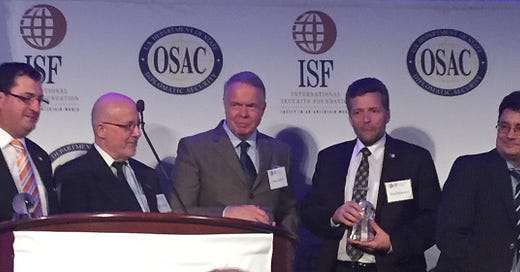Before we begin…
If you look at pyramids depicting Maslow’s Hierarchy of Needs, Hospitality, Safety and Security are the two bottom levels.
While TikTokers, self-appointed influencers, and companies with big marketing budgets wow us with their ability to balance like ballerinas on the pointy top of Maslow’s pyramid, their awareness of what’s actually holding them up is frighteningly scarce. (Hint: the platform they rely on is not a social media one.)
In this three-part series, I am looking at how the hospitality landscape is changing. In the coming years, the ability to do a pirouette on your tippy toe at the top of the pyramid will be replaced by a renewed focus on the foundational pieces we have neglected for far too long.
When people are asked what the greatest challenge facing hospitality is today, the answers are often variations on common themes: Inflation, Labour shortages, Climate Change, Housing affordability…
When I’m asked that question, I always have the same one-word answer.
Uncertainty
The only thing we know is that we don’t know what tomorrow brings. We like to think we know. We like to plan like we know. We behave like we know.
We do know that the foundation we all need to survive isn’t going to change.
Technology can change massively in a very short period of time. Humans will still evolve very slowly, and no matter how much technology changes, we still need food, shelter, and security.
And when I say we, I mean all of us!
Before we begin with the final instalment of this series, here’s the link to part 1 and here’s the link to part 2.
The Changing Landscape Part 3 - The Ubiquitous Value of Security
In 1987, when my career in hotels began, I took a pay cut from a lucrative gig as a ticket taker in a movie theatre and became a hotel security guard. Prior to my, in reality, unsuccessful interview, I’d never been in a five-star hotel before.
Then, as now, there was a labour shortage in hospitality. A stroke of good fortune opened the door to what became my 31-year career at the company that didn’t want to hire me.
The hotel was a full-service property in an emerging market. That meant we had a specialist for every discipline. We also had a large, in-house, security department. That’s where I got my start.
The emerging market was Norway… and it was emerging fast.
When markets mature, it’s like we suddenly can’t afford people anymore.
Shortly after I was promoted to Security Manager, two-thirds of the department was removed as a cost-saving measure. The economy was tanking and every department slashed staff.
I remember a General Manager in a Northern European hotel telling me what a bothersome cost security was. “I only approve what’s required, and even then, it’s too much money.”
When he was transferred from his mature market to an emerging market, he wanted more security personnel, more equipment, and more of everything security related. Cost was no longer an issue.
“Nothing is more important than security,” he said without remembering he was speaking to the same person to whom he’d said security cost too much only a year earlier.
When we showed him risk ratings and crime statistics that indicated he was actually in a safer destination, he didn’t believe the numbers.
In times of uncertainty, risks increase. Increasing uncertainty often coincides with economic downturns. When the CFO comes and says “Every department has to save X% of their costs”, they’re taking the easy way out. It looks great on their spreadsheets, but they are unnecessarily increasing the risk of incident and loss.
Staff that have their hours or paycheques reduced are more likely motivated to steal from an employer they feel has let them down. Guests that have happily flashed their credit cards during the good times, may be inclined to invoke satisfaction guarantees or even brazenly attempt to skip out on their bills. People are edgier, incidents are more common, and, in a challenging economy, every loss represents a larger piece of the pie.
Solutions to the challenges of difficult times are often found in the strangest places.
In a hotel that could no longer afford “unnecessary luxuries” such as a large security department, or lengthy and detailed staff safety and security training programmes, they saved time and money by conducting basic training for staff right in their departments. It was simple and focused on helping associates understand the risks of where they worked and how they could most safely avoid them while performing day-to-day tasks.
Surprisingly, the stewarding department, which had been plagued by high turnover and absenteeism, had almost no absenteeism at all. When they were asked why everyone suddenly showed up for work every day, the response was that prior to the safety training, they didn’t think the hotel cared about them… simple as that.
When we noticed many corporate clients were becoming far more focused on travel risk management and hotel security, we built relationships with our corporate security counterparts in those companies instead of allowing our hotels to accept the liability of ticking all the “Yes-boxes” on the lengthy survey forms companies sent to them before signing contracts.
A year later, it turned out that the ten companies we focused on building relationships with had increased their business in our hotels at a rate that was three times greater than the increase in business from the average company on the top 100 corporate client list.

The Chief Security Officer at one of those companies explained it to me: “It’s not that we believe your hotels are safer or more secure than others, it’s just that when we have VIP events, special needs, or when incidents happen we know we’ll be able to come straight to you rather than hope the individual hotel will work constructively with us. It makes my life easier!”
Companies understand that during travel, their personnel and their proprietary information are at an elevated risk.
Many hotel companies still don’t understand that corporate security departments often oversee travel and travel risk management in large companies today.
Hotel companies that help their corporate clients manage that elevated risk reap the ubiquitous benefits that are there for the taking.
Unfortunately, when you bring in number-focused consultants to evaluate your business efficiencies and they hand the tasks off to newly-graduated MBAs in junior consulting roles, this value isn’t apparent to them as they add and subtract figures on spreadsheets.
They consider themselves successful when the invoice they send is lower than the cost savings they propose…
The numbers always add up on the computers but nobody sees the value lost through loss of internal expertise and capability and nobody sees the money left on the table.
That concludes this three-part series on The Changing Landscape of Hospitality.
Success is not about campaigns and bandwagons, it’s about our ways of working.
Sustainability has nothing to do with saving the planet and everything to do with saving lives.
There’s hidden talent in your business. Find it.
Security is dependent on the everyday action of every employee at every level.
There’s no crystal ball and no quick fix. We’ll always need to live with uncertainty.
AI and machine learning will change a lot of things in a lot of ways, but people don’t change, we evolve slowly - our hopes, dreams, desires, and needs for social connections and interactions will be the same- we need to make the most of the ones that we have.
Our best opportunities will reveal themselves if we Communicate, Collaborate, Contribute, and Care…

Stay safe, Always Care
Thanks for being part of the Always Care Community!
We help hospitality businesses make jobs more meaningful and guest experiences more memorable by helping you make the most of the biggest differentiator you have – your people!
Let’s connect and discuss how we can help you.



